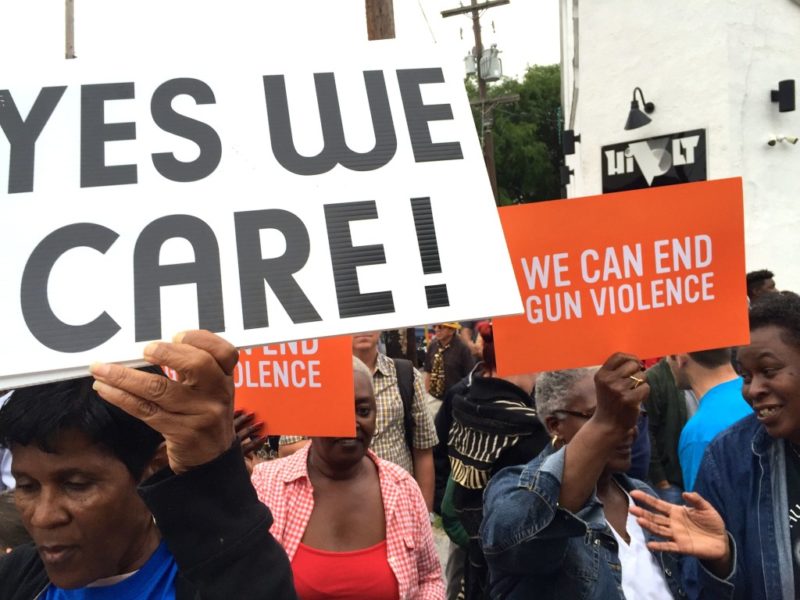
Tribute to Will Smith (photos by: Sarah Isabelle Prevot)
New Orleanians continue to mourn the loss of one of their own, Will Smith, to a tragic, violent death. On Friday, the New Orleans’ Saints held a public visitation for the former player for fans.
Life and death is a cycle that we are reminded of daily here. Comforted by a deep-rooted tradition in which we accept death, we celebrate life. But when it’s a life cut short, we wonder why, and how, that can be.
These were the questions that emanated from the hundreds of dedicated fans who lined up at the Saints practice facility on Friday to express their condolences, each in his or her own unique fashion. Some traveled by bicycle, some came with loved ones, while others came alone. Some dressed in their finest attire; others donned black and gold and honored the number 91. One even brought his horn. Raising the instrument to his lips, he sounded the sweet, familiar opening notes of When the Saints Go Marching In:
We are trav’ling in the footsteps
Of those who’ve gone before
But we’ll all be reunited (but if we stand reunited)
On a new and sunlit shore (then a new world is in store)
“This is my family; I’m going to see family,” said one fan when asked how she felt. With others, emotions proved difficult to translate into words. But one in particular could be heard again and again: “senseless.”
Visitors walked by family portraits and replicas of Smith’s college and professional lockers before arriving at his casket. “You see all his accomplishments, then you see his casket and it hits you,” observed one fan.
To understand the special bond between New Orleanians and the Saints, one need only look back to 2005, when Hurricane Katrina floodwaters overwhelmed the levees and devastated the city. New Orleans responded with resilience. But we needed a hero, and the Saints provided us with not one, but an entire team to rally around. They gave us hope.
“I went to that first game in the Superdome after Katrina and it felt so good,” recalled my neighbor, Ann, tears on her cheeks. “The team was the only thing going for the city. They rescued us from our worries.”
That bond was evident during Friday’s public viewing. Ropes were drawn to section off areas; however, Malcolm Jenkins and his wife; Jabari Greer; Courtney Roby; and Lance Moore each crossed over to the media side to say hello to friends as they shared their grief.

Photos by: Sarah Isabelle Prevot
Children from Smith’s daughter’s school came to show their support. “I’m sorry about your dad,” said one, embracing Lisa Smith. My heart sank. Smiths’ two young sons tossed a football with other children; the sound of them playing in the background provided a bit of light in the darkness. Smith’s wife was surrounded by loved ones. If my words make their way one day to you, Racquel, please know that we walk with you; we stand with you.
After the visitation, I joined the second line honoring Smith. We gathered in the Lower Garden District, where he had been killed, around a make-shift memorial, and marched through the streets to Louis Armstrong Park. We danced the entire way, celebrating his life. Gratitude was something we felt, and shared.
Rain had plagued New Orleans last week, as if the skies were also in mourning. But when the time came for us to come together, the rain ceased and the most peaceful winds began to blow, lifting spirits. Together we chanted along the way, “Rest in Peace! Will Smith! Rest in Peace! Will Smith!” We were family. Within minutes of arriving, I knew by name the people with whom I marched, and they knew mine.
I saw another writer I had met at the visitation marching with us. “Is this your first time to New Orleans?” I asked him. “No,” he replied, “but it is the most memorable.”
Knowing my city, it was memorable not because he had been assigned to report on the funeral services of an ex-NFL player, but because he had experienced first-hand that community bond. The love and gratitude New Orleans has for its Saints is undeniable, even to an outsider.
 NOLAbeings Multimedia artist Claire Bangser created NOLAbeings as a portrait-based story project that marries...
NOLAbeings Multimedia artist Claire Bangser created NOLAbeings as a portrait-based story project that marries...  Voodoo in New Orleans: Reviving history: New Orleans fortune telling This article takes a deep dive into the history of Voodoo in New Orleans, its hybridization with Catholicism, and its present-day place in the city's culture. The author visits fortune-tellers in the French Quarter, using their guidance as a tool for introspection rather than a deterministic predictor of the future. Through her experiences in New Orleans, the author feels a mystical connection to both the past and the future.
Voodoo in New Orleans: Reviving history: New Orleans fortune telling This article takes a deep dive into the history of Voodoo in New Orleans, its hybridization with Catholicism, and its present-day place in the city's culture. The author visits fortune-tellers in the French Quarter, using their guidance as a tool for introspection rather than a deterministic predictor of the future. Through her experiences in New Orleans, the author feels a mystical connection to both the past and the future. 